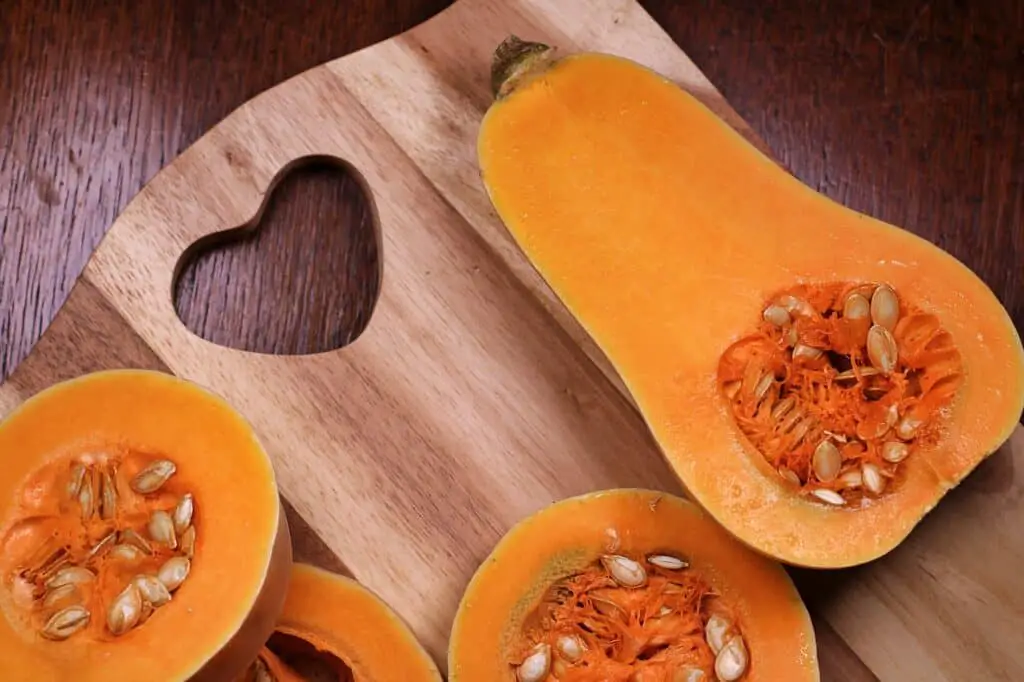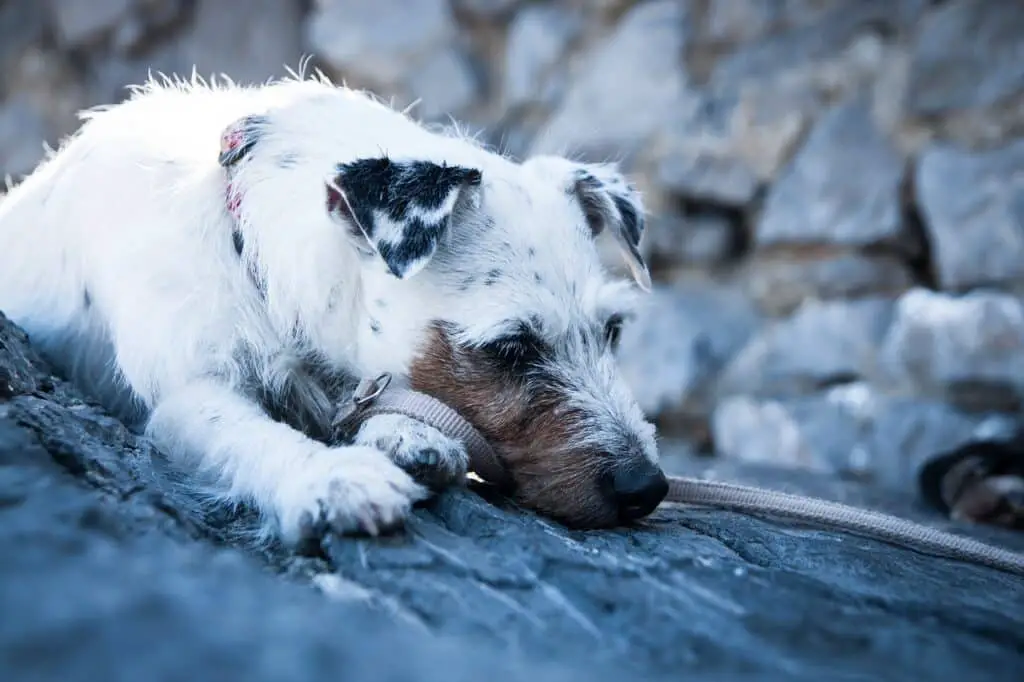Butternut squash has a sweet, nutty taste that makes it one of the favorite human fruits.
Apart from its taste, we eat butternut squash for nutritional values like vitamins and minerals.
As a dog parent, you’ll wonder whether your canine friend will be safe if you give him butternut squash.
So, can dogs eat butternut squash?
Yes, butternut squash contains potassium, calcium, and vitamins needed for a dog’s well-being.
Moreover, because it’s low in calories and fats, butternut squash is an excellent treat for dogs that want to lose weight.
Today, you’ll know how your dog benefits from eating butternut squash.
You’ll also be informed on the risks of butternut squash to your dog and the safe feeding practices to keep your canine safe.
Keep reading for these and other beneficial tips for your canine friend.

Benefits of Butternut Squash to Dogs
Before giving your pup any food, you want to know the benefit he gets.
Butternut squash is rich in:
- Vitamin B-6
- Thiamin
- Folate
- Potassium
- Dietary fiber
- Vitamin E
- Manganese
- Pantothenic acid
- Copper
- Vitamin A
These nutrients are beneficial to your dog in the following ways:
Maintaining Blood Homeostasis
Potassium is an essential dog electrolyte.
Sodium and potassium regulate the water content in dog cells, thereby balancing blood pH.
Potassium is necessary for dogs’ voluntary and involuntary muscle contractions and nerve impulses.
Nerve impulses are also vital for keeping the heart beating in rhythm.
Without potassium, your pup will experience muscle weakness and paralysis.
In severe cases, potassium deficiency leads to Hypokalemia in dogs.

Aiding in Digestion
Manganese is a mineral that’s not only crucial for humans but also for dogs.
This mineral aids in the absorption of other nutrients like calcium, phosphorus, and sodium.
Manganese also helps in the formation of bones and connective tissues.
Manganese is also an antioxidant.
As such, it helps in scavenging free radicals that damage cells.
The process ensures that your pup’s cells are healthy and functioning optimally.
The dietary fiber in butternut squash is essential for your dog’s gastrointestinal health.
It adds bulk to stool and prevents constipation.
Fiber also helps maintain a healthy weight by keeping your pup satiated for longer.
Fighting Inflammation
Vitamin E is a fat-soluble vitamin with potent antioxidant properties.
This vitamin helps to protect cell membranes from damage by free radicals.
Vitamin E also has anti-inflammatory properties that help to reduce swelling, stiffness, and joint pain in dogs.
Maintaining a Healthy and Shiny Coat
You’re always a happy dog parent when you see him with a shiny and healthy coat.
One way to achieve such a coat is by feeding him nutritious foods like butternut squash.
Butternut squash is rich in Vitamin A, a crucial nutrient for the growth and repair of body tissues.
Vitamin A keeps a dog’s skin and mucous membranes healthy.
Finally, vitamin A plays a crucial role in wound healing.
This vitamin promotes cell growth, thereby aiding in repairing damaged tissue.
Therefore, if you own a hunting dog prone to wounds, feed him butternut squash.
Vitamin A deficiency leads to dryness of the skin and hair loss in dogs.
On the other hand, an excess of this vitamin can lead to vomiting and diarrhea in dogs.
Energy Metabolism
Pantothenic acid is part of Coenzyme A (CoA).
CoA is essential for the metabolism of fats, proteins, and carbohydrates.
This vitamin also helps in the synthesis of hormones and neurotransmitters.
Coenzyme A is necessary for energy production in cells.
Therefore, pantothenic acid ensures that your pup has enough energy for his daily activities.
Pantothenic acid deficiency leads to poor appetite, vomiting, and diarrhea in dogs.

Risks of Feeding Dogs Butternut Squash
While butternut squash is rich in beneficial nutrients, this food also has some risks.
The risks associated with feeding butternut squash to dogs include:
Choking Hazard
Butternut squash contains seeds that can pose a choking hazard to dogs.
The seeds can also cause an intestinal blockage if swallowed.
Remove the seeds before feeding your dog butternut squash to avoid these risks.
You can also cook the squash without the seeds to make it safe for your pup.
Allergic Reaction
Like other foods, some dogs may be allergic to butternut squash.
The most common symptoms of an allergic reaction include vomiting, diarrhea, and difficulty breathing.
If your dog shows any symptoms after eating butternut squash, immediately take him to the vet.
Gastrointestinal Issues
Giving your furry friend too much butternut squash can be catastrophic.
This food is rich in fiber which can cause gastrointestinal issues like gas, bloating, and diarrhea.
Moreover, too much manganese in a dog’s body can lead to liver damage and neurological problems.
Safe Practises for Feeding a Dog Butternut Squash
It’s always safe to err on caution when feeding your pup new foods.
For butternut squash, the following practices will ensure your dog is safe:
- Introduce butternut squash gradually. Start by giving your dog a small amount of this food to see how he reacts. If he tolerates it well, increase the quantity gradually.
- Only feed your dog cooked butternut squash. Cooking this fruit makes it easier for your dog to digest.
- Puree cooked squash for puppies. If you’re feeding this food to a puppy, pureeing it will make it easier for him to eat.
- Remove the seeds before feeding your dog. Butternut squash seeds can pose a choking hazard to dogs.
Frequently Asked Questions
Is cooked butternut squash good for dogs?
Yes, cooked butternut squash is good for dogs as it’s easy to digest and contains beneficial nutrients.
Can I give my dog raw butternut squash?
No, you should never give your dog raw butternut squash.
This fruit is difficult to digest and can cause gastrointestinal issues like diarrhea, bloating, and vomiting.
How much butternut squash can I give my dog?
It depends on your dog’s size.
One to two pieces of cooked butternut squash per day is sufficient for medium-sized dogs.
For large dogs, two to three pieces per day are enough.
The Bottom Line
Butternut squash is healthy and nutritious food for dogs.
However, before giving your dog butternut squash, remove the seeds and cook it thoroughly.
If you’re giving your dog butternut squash for the first time, start with a small amount to see how he reacts.
If he tolerates it well, increase the quantity gradually.
- What Dog Breeds Have Pink Skin? - March 24, 2023
- What Are the Most Inspiring Dog Breeding Quotes? - March 20, 2023
- Can Pheromone Spray Help Improve Dog Breeding Results? - March 19, 2023








